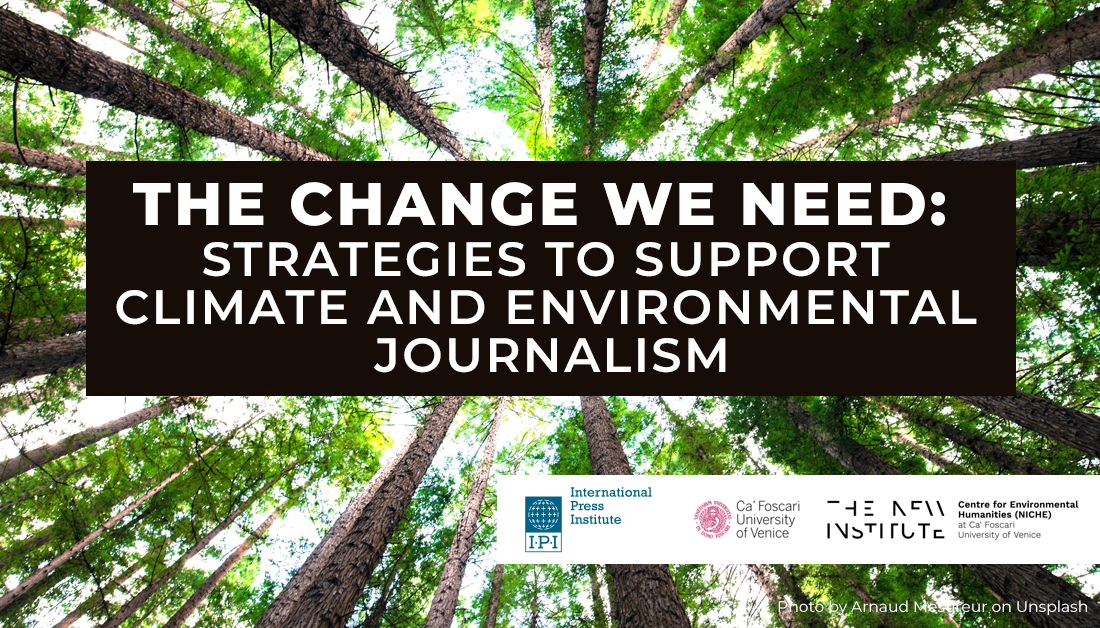A new study published today by the International Press Institute (IPI) assesses strategies for sustainable and impactful climate journalism, looking at the role of both newsrooms and journalism funders.
The field of climate and environmental journalism is growing fast. As the climate crisis deepens, newsrooms are scrambling to reorganize resources, develop capacity, and help audiences make sense of the change.
The study addresses this moment. Written by former IPI Executive Director Barbara Trionfi as part of her visiting scholarship at THE NEW INSTITUTE Centre for Environmental Humanities (NICHE) at the University of Venice, it critically analyzes different approaches adopted by media to produce and deliver fact-based, public-interest climate news. Among other pressing questions, it looks at strategies for reshaping the newsroom to more effectively cover climate topics as well as the type of coverage: Should we prioritize local, specialized, or mainstream reporting on climate? Is solutions journalism the answer?
The study also identifies areas in which donor support is most needed in the area of climate and environmental reporting, such as helping transform the ways newsrooms operate, build cooperation and partnerships, test new products, and forge stronger relationships with audiences.
Overall, the study finds a clear need for more resources, strategies, training, and investment to ensure climate and environmental journalism reaches audiences and contributes to finding solutions to the crisis. It also underscores the importance of un-siloing climate reporting. “Climate change and environmental degradation are pervasive and affect every aspect of our lives. Media coverage needs to reflect this”, the report says.
Trionfi, the author of the study, said: “All over the world, editors and journalists are standing up to the challenge of reinventing their work to cover the climate crisis accurately and effectively, reaching audiences and fulfilling their information needs. They deserve our support. This study is a first assessment of strategies to promote environmental journalism that serves the public interest. While it doesn’t aim at being comprehensive, it should inspire a conversation on one of the great challenges of today’s journalism.”
The study is published by IPI in cooperation with THE NEW INSTITUTE Centre for Environmental Humanities (NICHE) at the University of Venice, Italy.
NICHE Director Francesca Tarocco said: “From the unique vantage point of Venice, a city vulnerable to sea-level rise but also a living laboratory for a balanced ecosystem and a plural global community, NICHE fosters dialogue between leading scholars, scientific innovators, artists and writers, journalists and public stakeholders for a new alliance between humanities, social life, and natural sciences with a local and global impact. We are glad to have hosted Barbara Trionfi as a visiting scholar at NICHE.”
Building on the study’s findings
The report is part of IPI’s ambition to increase support for climate journalism and climate journalists.
“This excellent and, above all, timely study lays the foundation for IPI to structure and grow our work in support of public-interest climate and environmental journalism, in partnership with a range of stakeholders”, IPI Executive Director Frane Maroevic said. “We look forward to building on the study’s findings as the members of our global network of editors, journalists, and publishers search for ways to strengthen their coverage of the climate crisis.”
He added: “As the report also notes, climate coverage is an increasingly dangerous beat. As we move forward, our focus must be both on enabling quality, independent coverage of climate issues and on defending the safety of journalists attacked for uncovering environmental crimes or for simply stating scientific facts about the climate crisis.”



